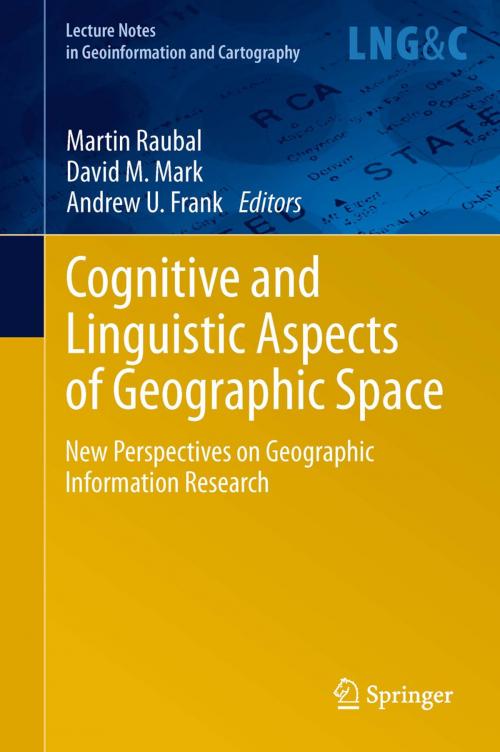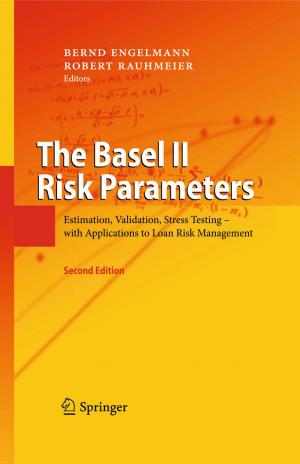Cognitive and Linguistic Aspects of Geographic Space
New Perspectives on Geographic Information Research
Nonfiction, Science & Nature, Technology, Remote Sensing, Science, Earth Sciences, Geography| Author: | ISBN: | 9783642343599 | |
| Publisher: | Springer Berlin Heidelberg | Publication: | January 30, 2013 |
| Imprint: | Springer | Language: | English |
| Author: | |
| ISBN: | 9783642343599 |
| Publisher: | Springer Berlin Heidelberg |
| Publication: | January 30, 2013 |
| Imprint: | Springer |
| Language: | English |
20 years ago, from July 8 to 20, 1990, 60 researchers gathered for two weeks at Castillo-Palacio Magalia in Las Navas del Marques (Avila Province, Spain) to discuss cognitive and linguistic aspects of geographic space. This meeting was the start of successful research on cognitive issues in geographic information science, produced an edited book (D. M. Mark and A. U. Frank, Eds., 1991, Cognitive and Linguistic Aspects of Geographic Space. NATO ASI Series D: Behavioural and Social Sciences 63. Kluwer, Dordrecht/Boston/London), and led to a biannual conference (COSIT), a refereed journal (Spatial Cognition and Computation), and a substantial and still growing research community.
It appeared worthwhile to assess the achievements and to reconsider the research challenges twenty years later. What has changed in the age of computational ontologies and cyber-infrastructures? Consider that 1990 the web was only about to emerge and the very first laptops had just appeared! The 2010 meeting brought together many of the original participants, but was also open to others, and invited contributions from all who are researching these topics. Early-career scientists, engineers, and humanists working at the intersection of cognitive science and geographic information science were invited to help with the re-assessment of research needs and approaches.
The meeting was very successful and compared the research agenda laid out in the 1990 book with achievements over the past twenty years and then turned to the future: What are the challenges today? What are worthwhile goals for basic research? What can be achieved in the next 20 years? What are the lessons learned?
This edited book will assess the current state of the field through chapters by participants in the 1990 and 2010 meetings and will also document an interdisciplinary research agenda for the future.
20 years ago, from July 8 to 20, 1990, 60 researchers gathered for two weeks at Castillo-Palacio Magalia in Las Navas del Marques (Avila Province, Spain) to discuss cognitive and linguistic aspects of geographic space. This meeting was the start of successful research on cognitive issues in geographic information science, produced an edited book (D. M. Mark and A. U. Frank, Eds., 1991, Cognitive and Linguistic Aspects of Geographic Space. NATO ASI Series D: Behavioural and Social Sciences 63. Kluwer, Dordrecht/Boston/London), and led to a biannual conference (COSIT), a refereed journal (Spatial Cognition and Computation), and a substantial and still growing research community.
It appeared worthwhile to assess the achievements and to reconsider the research challenges twenty years later. What has changed in the age of computational ontologies and cyber-infrastructures? Consider that 1990 the web was only about to emerge and the very first laptops had just appeared! The 2010 meeting brought together many of the original participants, but was also open to others, and invited contributions from all who are researching these topics. Early-career scientists, engineers, and humanists working at the intersection of cognitive science and geographic information science were invited to help with the re-assessment of research needs and approaches.
The meeting was very successful and compared the research agenda laid out in the 1990 book with achievements over the past twenty years and then turned to the future: What are the challenges today? What are worthwhile goals for basic research? What can be achieved in the next 20 years? What are the lessons learned?
This edited book will assess the current state of the field through chapters by participants in the 1990 and 2010 meetings and will also document an interdisciplinary research agenda for the future.















